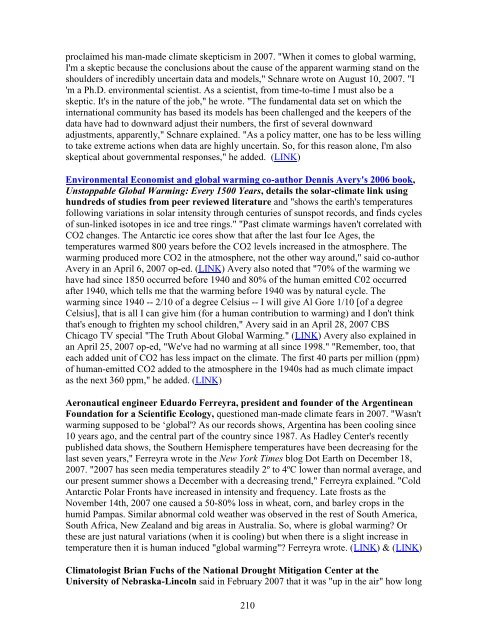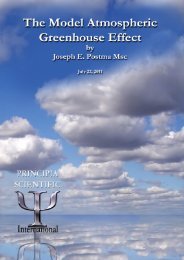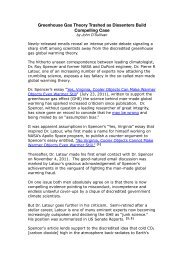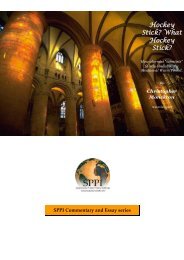Than 1000 International Scientists Dissent Over Man-Made Global ...
Than 1000 International Scientists Dissent Over Man-Made Global ...
Than 1000 International Scientists Dissent Over Man-Made Global ...
You also want an ePaper? Increase the reach of your titles
YUMPU automatically turns print PDFs into web optimized ePapers that Google loves.
proclaimed his man-made climate skepticism in 2007. "When it comes to global warming,<br />
I'm a skeptic because the conclusions about the cause of the apparent warming stand on the<br />
shoulders of incredibly uncertain data and models," Schnare wrote on August 10, 2007. "I<br />
'm a Ph.D. environmental scientist. As a scientist, from time-to-time I must also be a<br />
skeptic. It's in the nature of the job," he wrote. "The fundamental data set on which the<br />
international community has based its models has been challenged and the keepers of the<br />
data have had to downward adjust their numbers, the first of several downward<br />
adjustments, apparently," Schnare explained. "As a policy matter, one has to be less willing<br />
to take extreme actions when data are highly uncertain. So, for this reason alone, I'm also<br />
skeptical about governmental responses," he added. (LINK)<br />
Environmental Economist and global warming co-author Dennis Avery's 2006 book,<br />
Unstoppable <strong>Global</strong> Warming: Every 1500 Years, details the solar-climate link using<br />
hundreds of studies from peer reviewed literature and "shows the earth's temperatures<br />
following variations in solar intensity through centuries of sunspot records, and finds cycles<br />
of sun-linked isotopes in ice and tree rings." "Past climate warmings haven't correlated with<br />
CO2 changes. The Antarctic ice cores show that after the last four Ice Ages, the<br />
temperatures warmed 800 years before the CO2 levels increased in the atmosphere. The<br />
warming produced more CO2 in the atmosphere, not the other way around," said co-author<br />
Avery in an April 6, 2007 op-ed. (LINK) Avery also noted that "70% of the warming we<br />
have had since 1850 occurred before 1940 and 80% of the human emitted C02 occurred<br />
after 1940, which tells me that the warming before 1940 was by natural cycle. The<br />
warming since 1940 -- 2/10 of a degree Celsius -- I will give Al Gore 1/10 [of a degree<br />
Celsius], that is all I can give him (for a human contribution to warming) and I don't think<br />
that's enough to frighten my school children," Avery said in an April 28, 2007 CBS<br />
Chicago TV special "The Truth About <strong>Global</strong> Warming." (LINK) Avery also explained in<br />
an April 25, 2007 op-ed, "We've had no warming at all since 1998." "Remember, too, that<br />
each added unit of CO2 has less impact on the climate. The first 40 parts per million (ppm)<br />
of human-emitted CO2 added to the atmosphere in the 1940s had as much climate impact<br />
as the next 360 ppm," he added. (LINK)<br />
Aeronautical engineer Eduardo Ferreyra, president and founder of the Argentinean<br />
Foundation for a Scientific Ecology, questioned man-made climate fears in 2007. "Wasn't<br />
warming supposed to be ‗global'? As our records shows, Argentina has been cooling since<br />
10 years ago, and the central part of the country since 1987. As Hadley Center's recently<br />
published data shows, the Southern Hemisphere temperatures have been decreasing for the<br />
last seven years," Ferreyra wrote in the New York Times blog Dot Earth on December 18,<br />
2007. "2007 has seen media temperatures steadily 2º to 4ºC lower than normal average, and<br />
our present summer shows a December with a decreasing trend," Ferreyra explained. "Cold<br />
Antarctic Polar Fronts have increased in intensity and frequency. Late frosts as the<br />
November 14th, 2007 one caused a 50-80% loss in wheat, corn, and barley crops in the<br />
humid Pampas. Similar abnormal cold weather was observed in the rest of South America,<br />
South Africa, New Zealand and big areas in Australia. So, where is global warming? Or<br />
these are just natural variations (when it is cooling) but when there is a slight increase in<br />
temperature then it is human induced "global warming"? Ferreyra wrote. (LINK) & (LINK)<br />
Climatologist Brian Fuchs of the National Drought Mitigation Center at the<br />
University of Nebraska-Lincoln said in February 2007 that it was "up in the air" how long<br />
210





